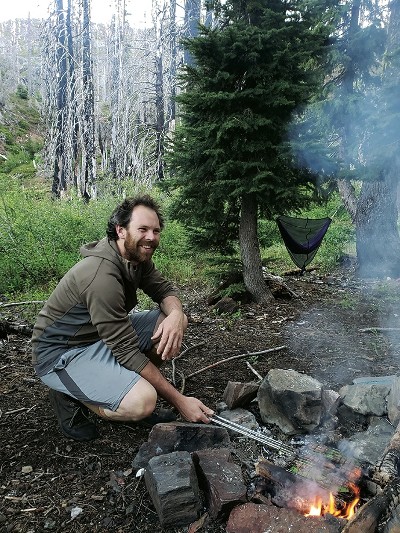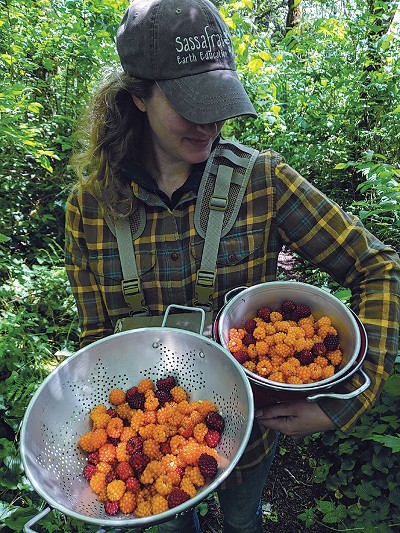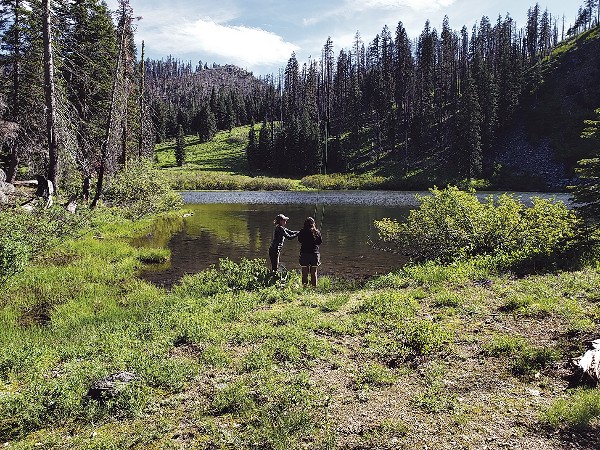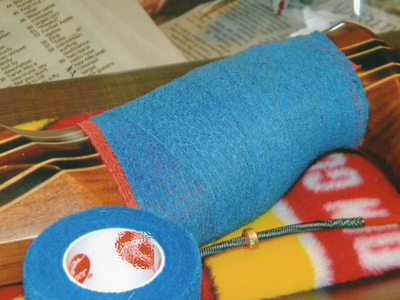Heather and Meghan practice casting on the fly rod. Fishing, especially while backpacking, is another easy avenue to introduce people to consumptive outdoor activities.
I was a quarter-mile from the trailhead when I remembered I had left the most important piece of gear at the truck. I turned back to retrieve a pair of tenderloins, still cold and soaking in a light marinade. Glad I had not forgotten these golden delicacies miles from the truck, I turned onward for my 11-mile trek to meet my wife and two friends at a distant ridge line lake in the wilderness of northwestern California. My goal was to make camp before sunset, and after a quick dip in the lake, let a fire burn down to coals, and cook the wild meat in the mountains where it was grown.
Our two friends are no strangers to hunting. They often partake in the meals shared by those in our group who do hunt, yet they do not hunt. And this was not a hunting trip. It was mid-summer and we were all in the mountains to enjoy the beauty of sunrises and sunsets, watch and listen to the bustle of late-spring bird activity, and (selfishly) scout for new hunting locations.
I am a hunter. I am also a biologist, a backpacker, an amateur birder, a fisherman, a tracker, and a naturalist. I spend most of my time outside, yet depending on the season if you run into me I could have a variety of implements in my hands from baskets to gather berries, a bucket for mussels, a field guide to wildflowers, a bag for edible mushrooms, or a bow and arrow. I thoroughly enjoy experiencing the natural world outside of the hunting season, and when I do, I am often not in the company of other hunters.

The author prepares an afternoon snack for campers. Cooking over a fire is a fun method of food preparation.
Our summer backpacking-fishing trips into the local wilderness by our home are a highlight of every year. I love the mountain lake and stream trout fishing. I love to explore without the pressure we bowhunters place on ourselves to not make a mistake. I love relaxing in the midday sun after a swim in ice cold lakes (some of which are fed by permanent snow fields, even here in California, but they have been diminishing in size the past couple of decades). And I get to spend time in the woods with friends who don’t hunt. They are all lovers of the natural world, and some are incredible naturalists from whom I constantly learn.
While in the woods outside of hunting seasons, most of the people I encounter are other recreational non-hunter users of the wilderness. My interactions with them are almost always positive. I don’t often announce my desire to eat wild animals, either during our conversation or with my clothes (I’m not wearing camouflage when not hunting), so the conversation easily flows from talk of bears sighted to the temperature of the lake for swimming. But then around early August my focus shifts, and I walk the same trails with a selfbow in hand, often still encountering backpacking non-hunters along the way.
I strive to maintain positive interactions with other recreationists in the wilderness while I am hunting. I suspect carrying a wooden bow is less threatening than a firearm or even a modern compound device. I pause to talk with folks along the trail, and if they inquire, then I take the time to show them my tackle and talk about how close and intimate I prefer to be with a deer before shooting. Often, they are intrigued and supportive of my actions. I hope this is the case for all interactions between hunters and non-hunters who both use and love the same wild landscapes.
One day, while bowhunting for elk in Colorado, I saw a through-hiker cruising along a trail. He was dressed in more orange than a Halloween jack-o-lantern; head to toe he was covered in blaze garments. I suspected his outlook of hunters was not too positive, and he expressed no interest in conversing. I smiled and we went our own ways.
His assumed lack of confidence in hunters mistaking a person for game (hence all the blaze clothing) is possibly based on previous encounters with “hunters.” I have heard from non-hunting friends (and have seen in person) how much trash is found in the woods once hunting season begins. Toilet paper, food wrappers, and plastic water bottles seem to be the most ubiquitous items found around “hunters” camps. I find it incredulous that someone identifying as a hunter, a supposed lover of the natural world, would leave a camp in such disarray. I find trash around backpacking camps as well, but they are not the demographic I am speaking to right now.

Heather Taylor collecting salmonberries in the spring. Foraging for edible plants is another activity they enjoy beyond hunting that keeps them engaged with the natural world.
My goal when hunting is to go unnoticed: leave a clean camp, walk quietly, disturb as little as possible. Our actions as hunters reverberate well beyond the “hero pictures” circulating on the internet. Following rules around road use, leaving a clean camp, and talking respectfully with other recreationists goes a long way toward the positive image of hunters we so desperately need right now. Most of us hunters are in the woods pursuing other interests throughout the year beyond hunting, and those outings often provide great opportunities to interact with non-hunters in a positive light.
Back at camp with my friends, we dined on grilled meat and slept under a sky of a thousand stars. The following day I explored and found a hillside of seeping wet meadows and early oak brush, an ideal location to hunt for archery deer and bear. The “scouting” trip proved fruitful, and I was able to kill a young buck with my selfbow that fall. The grueling eight and three-quarter mile pack to my truck was rewarding yet challenging. Along the hike out I encountered a few groups of backpackers starting their adventure. We paused on the trail long enough to exchange hellos and excited queries about the deer from them. I was able to muster some short grunts and thanks for the gift, but made it clear I still had a long way to haul this heavy load. The look on their faces was not of disgust, rather it was an intrigued expression. I hoped the short engagements were positive, and maybe one day they would be inspired to pick up the stick and string.
I value the time I spend hunting; however, I also love the periods of outdoor activities I engage in while not hunting. Furthermore, I value the support of all people who love the natural world, whether they hunt or not. Let us strive, as hunters, to leave the most positive impact on other recreationists. Who knows, a non-hunting backpacking trip may lead to your next hunting secret spot. Keep a clean camp and speak nicely to those you meet on the trail.
Preston accompanies his friends on summer backpacking trips, feigning interest in afternoon naps and full moons over granite basins, all the while secretly he searches for the next best hunting spot. When he does work, it is as a biologist for the Yurok Tribe in Klamath, California.







Leave A Comment